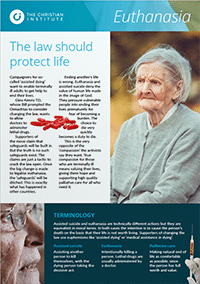A Peer has criticised the latest push to legalise assisted suicide, saying there is no evidence for a change in the law.
Lord Falconer of Thoroton tabled his “Assisted Dying Bill” in the House of Lords last week, which would allow a doctor to help the suicide of a terminally ill patient who had six months or less to live.
But former junior Health Minister Baroness Cumberlege has written to The Times to say the present law is adequate.
Evidence
She said, “the evidence does not point towards legalisation.”
“A study a few years ago found that doctors caring for terminally ill people rarely felt that the law posed problems for the care of their patients or that new laws were desirable.”
She commends an editorial in The Times on Saturday which said the Bill was a “step too far”.
Danger
The newspaper said there is a danger of “a large increase in assisted suicides as it becomes more legally straightforward”.
The editorial also said this was the reason “many lobbyists for the disabled oppose the Bill, concerned that people will be put under pressure to end their lives”.
A lecturer in palliative medicine said the Bill is “illogical” in a letter to The Times.
Improve
Dr David Jeffrey from the University of Edinburgh, said those involved in healthcare should be “planning how to improve psychosocial care of patients and their families” rather than pushing to legalise assisted suicide.
Peter Saunders, head of the Care Not Killing alliance, said Lord Falconer’s Bill would change 2,400 years of history in overturning the Hippocratic Oath for doctors.
He also warned about the “pattern of incremental extension” which has been seen in countries where assisted suicide has been legalised.


